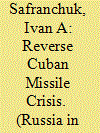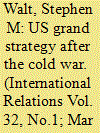| Srl | Item |
| 1 |
ID:
139036


|
|
|
|
|
| Summary/Abstract |
Since the end of the Cold War, the United States has pursued a two-pronged strategy towards China. On the one hand, Washington has sought to engage Beijing across a wide range of domains, including through bilateral diplomacy, participation in multilateral institutions, trade, investment, scientific cooperation, educational and cultural exchange, civil-society initiatives and military-to-military dialogues. While activity in most of these areas extends back to the initial Nixon–Kissinger ‘opening’ to China in the late 1960s, since the early 1990s there has been a substantial broadening and deepening in each.
|
|
|
|
|
|
|
|
|
|
|
|
|
|
|
|
| 2 |
ID:
189836


|
|
|
|
|
| Summary/Abstract |
This article conceptualizes the current crises around Ukraine and Taiwan
as “a reverse Cuban missile crisis.” The Cuban missile crisis was a turning
point in the history of the Cold War. The two superpowers found themselves
at the brink of mutual annihilation and turned to negotiations to prevent
it. Today the transformation of the world order and escalation of the great
power competition can culminate in a new crisis like the Cuban one, and
with a similar outcome. However, in contrast to the USSR which ultimately
recognized the United States’ red lines, today the U.S. does not recognize
Russia’s and China’s red lines, denying the very legitimacy of red lines as
such. The U.S. plans to retain its hegemony and seeks to achieve it with the
help of its regional allies. This strategy of “offshore balancing” has proven
to be quite useful for the U.S., which seems to ignore any discontent coming
from Russia and China.
|
|
|
|
|
|
|
|
|
|
|
|
|
|
|
|
| 3 |
ID:
132098


|
|
|
|
|
| Publication |
2014.
|
| Summary/Abstract |
While it is a truism that British security and prosperity have their foundation in maritime power, this has not translated into a conceptualisation of sea power that can be of practical use to policy-makers and practitioners. David Blagden applies two crucial concepts in security studies to the UK's contemporary situation and argues that a maritime grand strategy based on offshore balancing will serve the country well in the future.
|
|
|
|
|
|
|
|
|
|
|
|
|
|
|
|
| 4 |
ID:
157783


|
|
|
|
|
| Summary/Abstract |
This article uses realism to explain past US grand strategy and prescribe what it should be today. Throughout its history, the United States has generally acted as realism depicts. The end of the Cold War reduced the structural constraints that states normally face in anarchy, and a bipartisan coalition of foreign policy elites attempted to use this favorable position to expand the US-led ‘liberal world order’. Their efforts mostly failed, however, and the United States should now return to a more realistic strategy – offshore balancing – that served it well in the past. Washington should rely on local allies to uphold the balance of power in Europe and the Middle East and focus on leading a balancing coalition in Asia. Unfortunately, President Donald Trump lacks the knowledge, competence, and character to pursue this sensible course, and his cavalier approach to foreign policy is likely to damage America’s international position significantly.
|
|
|
|
|
|
|
|
|
|
|
|
|
|
|
|